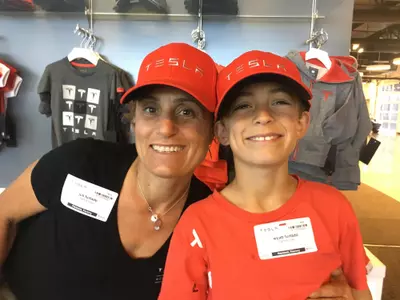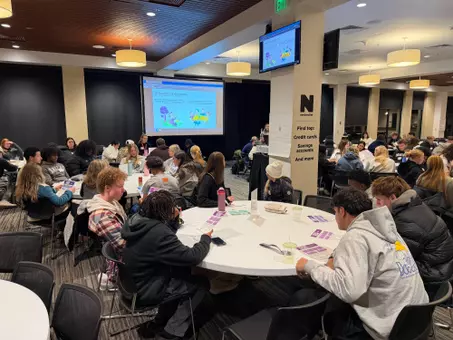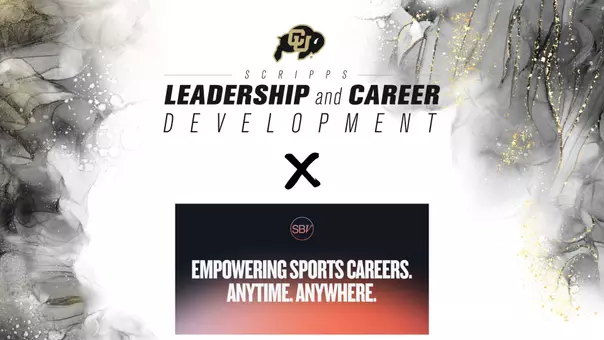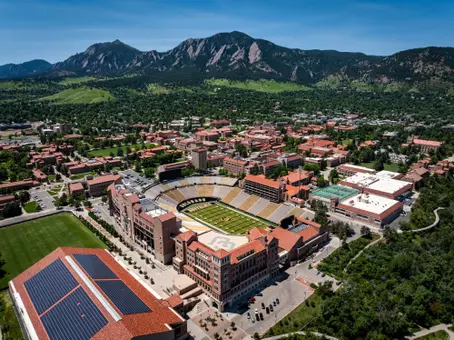Colorado University Athletics

Former Buff, Cycling Great Furtado Wants To Help CU Student-Athletes
July 06, 2018 | General, Alumni C Club, Neill Woelk, Scripps Leadership & Career Development , Psychological Health & Performance
BOULDER — There is still a big part of Juli Furtado that connects with Boulder and the University of Colorado.
It's no wonder.
Boulder is where she found a home after leaving her East Coast stomping grounds as a teenager. It is where she earned All-American honors as a skier for the Buffs, where she began a cycling career that catapulted her to the very pinnacle of the sport — and where she made the transition from "lost" teenager to freewheeling, take-the-world-by-the-handlebars and give-em-hell world champion.
Now, Furtado — who currently lives in Santa Cruz, Calif., — wants to give back to the place and institution that played such a major role in shaping her life. She hopes to do so by sharing with current Buffs some life lessons that might help them avoid some pitfalls she has encountered and speaking to them bluntly about an American epidemic that claims roughly 45,000 lives every year — suicide.
"I can relate to young athletes," Furtado said on a recent trip to Boulder. "I'm not your traditional 50-whatever. In terms of the emotional difficulties these students face, I don't think there's a part of it I haven't had to experience. I was in their shoes. I know what they are dealing with every day and I know what they are thinking about. Honestly, I think I can make a difference."
Furtado certainly has the resume to get their attention.
A member of the U.S. National Ski Team at age 15 — she was once called the "future of the sport" — Furtado turned to cycling after knee injuries ended her skiing career. There, she took the world by storm, winning three World Cup titles and putting together a streak of 17 consecutive wins in international and domestic national series races, along with a berth on the 1996 U.S. Olympic team.
Simply, she was one of the most dominant athletes of her time, and as a result, gained the celebrity status that accompanies such success. Furtado was featured on the cover of countless magazines, and she earned a reputation as a fun-loving competitor whose sense of humor was eclipsed only by her domination of opponents and an almost ruthless competitive fire.
Even when her cycling career came to a premature end — an autoimmune disorder diagnosis forced her into retirement at age 30 — Furtado managed to carve out more success. She eschewed the "traditional" route of the retirement circuit and product endorsement and instead began her own line of mountain bike parts designed specifically for women, which eventually led to Juliana Bikes. Billed as the "original women's mountain bike," they were designed specifically for females and are still on the market today.
That is the Furtado most people recognize and remember.
But recently, Furtado has found herself back into the limelight, spurred by the recent suicides of fashion designer Kate Spade and celebrity chef Anthony Bourdain. Those were events that finally convinced her she should reach out and make a difference if at all possible.
You see, Furtado is no stranger to suicide. It has been a haunting, ever-present specter in her life since her childhood, a side of her life that only a few people knew — until recently.
Furtado grew up in a single-parent household in Vermont. Her mother, Nina, repeatedly told Juli and her siblings that she would someday take her own life, and that her children were to blame. When her mother actually followed through with the threat in 1995, Juli knew down deep that it was in no way her fault, but it nevertheless left a lasting emotional scar. That wound was then compounded when Juli's sister, Gia, took her own life at age 50.
"I know I am not to blame for my mother's death," Furtado said. "But when you are a kid and you hear that, you do believe the problems are your fault. You grow up with that and you don't want to tell people about what your mother said because you think they will blame you. Logically, I now know I'm not to blame, but emotionally, you carry those scars with you throughout your life."
Furtado escaped that toxic childhood environment by first learning to ski, then becoming a child prodigy. She attended the prestigious Stratton Mountain School in Vermont and soon earned a berth on the U.S. Team.
But when injuries ended her international career and she graduated from Stratton, she was "lost."
"I literally had nowhere to go," she said. "I just knew I had to leave. Essentially, I was homeless."
So, she hopped on Interstate 70 and headed west. She contacted an old friend from the U.S. Ski Team in Vail, and soon ended up in Boulder. She skied one year for the Buffs — earning All-American honors in 1987 — while also attending the CU Business School. When her bad knees finally prevented her from skiing at all, she turned to cycling and soon became a world class competitor.
"Boulder and CU were important in a lot of ways," Furtado said. "It's going to sound funny, but a very important moment was when I adopted a dog. That dog (Zachariah) saved my life. She was me, I was her, and she was the only constant I had from the age of 19 to 31. She was my family. There are even pictures of her with me on the cover of magazines."
Furtado took the cycling world by storm, but that career ended in 1997, one year after sickness and poor conditions conspired to produce a disappointing seventh-place finish in the Olympics. An incredibly successful career had been cut short in its prime.
Still, the stage was set for the next chapter. Retirement, endorsements and a life of trading on her past successes awaited.
But Furtado refused to follow the conventional retirement path. She worked as a drive-time news announcer for a local radio station. She became involved in mountain bike parts design, developing components engineered specifically for women.
And, as a huge fan of the TV sitcom "Seinfeld," she actually emulated one of its characters, Cosmo Kramer, by renting an office in Santa Cruz, hiring an assistant — and "doing nothing."
"I did some crazy, goofy things," she said. "I was not going to go down that traditional retirement route."
Along the way, she also became the mother to a son, Wyatt, and her business interests steadily grew. In 2013, the Juliana Bike, a frame designed for women, was unveiled and became a success.
Thus, while by no means traditional, her life seemed to be following a path and pattern that was familiar to those on the outside. When Juli Furtado faced adversity, she conquered it and came away smiling.
And then …
Then it all came tumbling down. Three years ago, after a lifetime of looking tough times in the eye and laughing, Furtado crashed.
Hard.
"I just shut down," she said. "I had a lot of stressors on me — major stressors that would have been hard on anyone — and for the first time in my life, my fight went away. It was like, 'I'm done. I can't do this anymore. I've already used up everything I have.' I had spent my live overcoming things and I just quit. Even my sense of humor went away, which had never happened before. Never."
It turned out to be the most difficult time in her life. But Furtado finally sought help, checking into a clinic that specialized in behavioral health. Her insomnia and other issues slowly disappeared or abated, and — perhaps most tellingly — her sense of humor came back.
She slowly returned to normal — "normal is a loose definition for me," she says with a grin — and then began considering how she might be able to help others.
The answer came within the span of a few weeks. When Spade and Bourdain took their own lives earlier this year, Furtado knew she could not sit on the sidelines any longer. She sent an email to CU Athletic Director Rick George, asking if she could possibly do something to connect with the community and university that had meant so much to her years ago.
George, whose latest three-year plan for CU Athletics identifies student-athletes' mental health and well-being a top priority, saw the potential and immediately wrote back. Furtado last week flew to Boulder and spent a day meeting with Athletic Department officials.
"There's no doubt she can have an impact," George said. "She has lived the life our student-athletes are currently living. She's had her struggles in athletics and overcome them.
"But she's also had struggles in her personal life and had to deal with them. For her to be able to come and share that message with our student-athletes would clearly be impactful. Someone who has lived it, who has gone through it, who has overcome it, can be really helpful for them."
Furtado doesn't plan on working any miracles. But she does believe she has a message that will resonate.
"I know that if I would have opened up much longer ago, I would be a different person today," Furtado said. "If someone would have talked to me, gotten my attention, maybe I would have addressed this stuff at a younger age and maybe I would have had a better life emotionally."
Her goal will be to help young people realize that heading off suicide can come long before it's an "either-or" choice.
"Suicide gets clumped into suicide prevention," Furtado said. "We need to get there before that. I would like it to be how to deal with life — before you get to the word 'suicide' and you're calling that hotline."
And, she freely admits, the chance to come back to a place that holds so many fond memories will also play a role in her continued recovery.
"I need to do this," she said. "I love Boulder and I love CU, and I want this to be a part of my life."
Meanwhile, she will also continue pursuing her other passions. She is currently collaborating on a book about her life — "it's one way I can get into bookstores all the time" — and she has started a YouTube channel, "Desperately Seeking Seinfeld." Her sense of humor, something she has always considered a bedrock strength and a trait that is impossible to miss in any conversation, is something she hopes to use even more as she embarks on the next chapter of her life.
"I want to be a good example and I want to help people," she said. "I want to be a good mother. I want to have all these things filling my life because if I'm going to be a good example, I need to show that you can do all these different things. I want to show that you can live life if you fill it with all the things you love doing.
"And, if I can help some people along the way, maybe help change someone's life — maybe keep one person alive — that will be amazing."
Contact: Neill.Woelk@Colorado.edu





